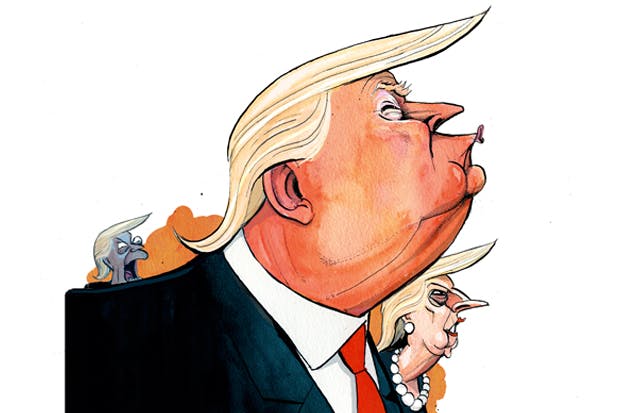When little known California congressman Eric Swalwell announced his decision to seek the Democratic presidential nomination this month, the former county prosecutor became the 18th Democratic candidate to enter the race. There are so many Democrats running for president of the United States that it’s becoming tiresome to track them all. Most—like Swalwell, Maryland congressman John Delaney, Hawaii congresswoman Tulsi Gabbard, author Marianne Williamson, and businessman Andrew Yang—have about as much of a chance winning the Democratic party nomination as Huddersfield do of becoming Premier League champions. But improbability has never stopped the most narcissistic politician from believing he or she is qualified to run the most powerful country on the planet. Why should it now?
Americans are more than two months away from the first Democratic presidential debate, yet the 2020 Democratic primary has already been going on for months. Presidential election seasons in the United States begin earlier and earlier with each passing cycle; 2020 contenders were campaigning, fundraising, and acting like presidential candidates long before they officially declared their candidacies. Between now and the first televised debate in June, a few more will no doubt throw their hats into the ring—including the most high-profile of them all, former vice president Joe Biden.
The upcoming Democratic primary will be the most crowded and exciting field since 2008, when Barack Obama shocked the Democratic political establishment by squaring off against Hillary Clinton and winning. That race was also jam packed with candidates, but at least the 2008 primary was winnowed down to two top contenders early on. The Obama-Clinton rivalry may look like a cakewalk compared to the primary battle America’s registered Democratic voters will be asked to participate in.
With such a large field, each candidate will have to find a way to separate himself or herself from the pack. If one of the first rules in American presidential politics is to build a war chest in preparation for a run, the second is to use the war chest wisely. That partly means coming up with a message that sticks, one that can drive a campaign and attract the attention of everybody—from the reporters who cover the beat to the prospective voters along the rope-lines waiting to be wooed.
For Bill Clinton, the slogan was simple but highly effective: “it’s the economy, stupid.” With Clinton’s power of persuasion, charming nature, and a waffling and detached opponent in President George H.W. Bush, the slogan helped to get a Democrat in the White House for the first time in 12 years. For Barack Obama, the theme was about hope, change, and the dawn of a new day after eight years of George W. Bush. That, too, worked out quite well for the young senator from Illinois. Bernie Sanders had a compelling 2016 campaign message that tapped into a sense of beleaguerment, economic despair and frustration with the political status-quo and the moneyed class. The fact Sanders lost the nomination to the more establishment Hillary Clinton doesn’t obviate the enormous influence the wily, white-haired septuagenarian has had on the Democratic Party platform ever since.
This year, there is no central message—at least not at this early stage in the game. The field is far too claustrophobic for a single candidate to capture everybody’s attention. Attacking Donald Trump is in many ways not the first order of business for these candidates; right now, each and every one of them are jockeying for position, competing for small-dollar donations, and out-bidding one another for the mantle of the most diehard progressive in the country. The White House hopefuls are talking about different issues and offering up well-honed proposals. It’s akin to throwing spaghetti at the wall and seeing what sticks.
The problem Democrats have, however, is that the same beating-heart liberalism that packages government-run health insurance, Green New Deals, radical social change, and high tax rates on millionaires and billionaires run the risk of getting Americans who prefer more incrementalism to think about perhaps casting their ballots for Trump. Democrats scoff at this suggestion; the party, after all, recaptured the House of Representatives last year on the backs of suburbanites who grew disillusioned with Trump after his first two years in office.
What these same Democrats ignore at their peril, though, is that presidential election years are quite different. Republicans who may have waffled during the midterm elections and voted for a Democrat on the ballot tend to close ranks and stick together when the prize of the White House is involved. And Trump, despite his low approval ratings, obnoxiousness, legal scrutiny, political drama, and dog-whistling, is a remarkably good campaigner with a lot of wealthy friends and political allies willing to write him large cheques.
The Democratic Party’s messaging is all over the place. It will be continue that way until the field of two dozen candidates decreases to four or five. If at that point the messaging isn’t clear, concise, convincing, and appealing, Democrats will be in jeopardy of losing a winnable election—and they will only have themselves to blame for another gut-wrenching defeat.






Comments